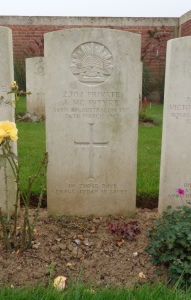TIMELINE March 1917
Friday, 2 March 1917
Private Jack Henry HUNT (45th Battalion) was evacuated to England aboard the Hospital Ship Aberdonian from Boulogne, France, with Trench Feet.
Private Joseph John WILLIAMS (13th Battalion) was sent to the 8th Australian Field Ambulance in France suffering from Scabies, and he was moved to the 5th Rest Station later that day with Influenza. He was later moved to the 5th General Hospital at Rouen with Trench Fever.
Saturday, 3 March 1917
Private Jack Henry HUNT (45th Battalion) was admitted to the Voluntary Aid Hospital at Cheltenham, England, with Trench Feet (severe). (He was later transferred to the 2nd Southern General Hospital where the third toe of his right foot was amputated).
Monday, 5 March 1917
Private Lewis Reginald DUFF (45th Battalion) was promoted to Lance Corporal.
Wednesday, 7 March 1917
Private Cyril Roy MCMILLAN (45th Battalion) went to the 12th Australian Field Ambulance in France suffering from Trench Feet. He was moved to 3rd Australian Field Ambulance the same day.
Private Joseph John WILLIAMS (13th Battalion) was sent to a Casualty Clearing Station with Trench Feet.
Thursday, 8 March 1917
On 8th March Private Cyril Roy MCMILLAN (45th Battalion) was admitted to the 45th Casualty Clearing Station with Trench Feet.
Trooper Francis Noel WHITE (6th Light Horse Regiment) departed Port Suez about the NZ transport Willochra for return to Australia.
Friday, 9 March 1917
Private Bert KILDUFF (4th Pioneer Battalion) was admitted to the 8th Australian Field Ambulance in France for dental treatment.
Sunday, 11 March 1917
Private Cyril Roy MCMILLAN (45th Battalion) was placed aboard the 9th Ambulance Train and moved to the 3rd Stationery Hospital at Rouen, France, with Trench Feet.
Private Thomas SHAW (4th Pioneer Battalion) arrived back in Australia at Sydney aboard the Kanowna.
Monday, 12 March 1917
Private Alfred WARDROP (45th Battalion) had his left foot amputated 3 inches above his ankle at the St John’s Ambulance Brigade Hospital at Etaples, France.
Private Joseph John WILLIAMS (13th Battalion) was placed aboard the Hospital Ship Grantully Castle at Le Havre for evacuation to England (Trench Fever).
Tuesday, 13 March 1917
Private Cyril Roy MCMILLAN (45th Battalion) was placed aboard the Hospital Ship Warilda for evacuation to England with Trench Feet.
Private Alfred WARDROP (45th Battalion) was evacuated to England on the HS Gloucester Castle sailing from Le Havre, following the amputation of his left foot.
Private Joseph John WILLIAMS (13th Battalion) was admitted to the 2nd Southern General Hospital at Bristol in England (Trench Fever).
Private William CAIRNS (13th Battalion) was sent to the 13th Australian Field Ambulance suffering from Influenza.
Wednesday, 14 March 1917
On 14th March 1917 Cyril Roy MCMILLAN (45th Battalion) was admitted to the Kitchener Military Hospital at Brighton, England, with Trench Feet.
Private Andrew James MCGREGOR (2nd Australian Field Bakery) was admitted to the 30th General Hospital at Calais France suffering from Myalgia.
Private Alfred WARDROP (45th Battalion) was admitted to the 3rd London General Hospital (recovering from amputated left foot).
Friday, 16 March 1917
Private William Charles WALKER (54th Battalion) was admitted to the Wareham Isolation Hospital in England suffering Mumps.
Saturday, 17 March 1917
Private Charles Henry HUNT (45th Battalion) departed England about the H.T. Beltana bound for Australia, suffering from Pleurisy and Rheumatism.
Private Daniel LYNCH (13th Battalion) departed England aboard the H.T. Beltana bound for Australia, for discharge for being over age and debility.
Private Bert KILDUFF (4th Pioneer Battalion) was discharged from the 8th Australian Field Ambulance following his dental treatment earlier in the month, but was readmitted on the same day suffering Urethral Stricture.
Sunday 18th March 1917
On 18th March Private Bert KILDUFF (4th Pioneer Battalion) was transferred to the 3rd Casualty Clearing Station with Urethral Stricture.
Wednesday, 21 March 1917
Private Bernard COYTE (13th Battalion) was sent to the 13th Australian Field Ambulance in France with Influenza.
Private Bert KILDUFF (4th Pioneer Battalion) was transferred by ambulance train to the 1st Australian General Hospital with Urethral Stricture.
Private Andrew James MCGREGOR (2nd Australian Field Bakery) was discharged and returned to his unit.
Thursday, 22 March 1917
Private Archibald MCINTYRE (56th Battalion) was evacuated to the 5th Divisional Rest Station in France sick.
Friday, 23 March 1917
Private Archibald MCINTYRE (56th Battalion) was admitted to a Casualty Clearing Station.
Saturday, 24 March 1917
Private Archibald MCINTYRE (56th Battalion) was diagnosed with Bronchitis.
Sunday, 25 March 1917
Private Archibald MCINTYRE (56th Battalion) was diagnosed at the 2/1st South Midland Casualty Clearing Station in France with Cerebro Spinal Meningitis.
Monday, 26 March 1917
Private Archibald MCINTYRE (56th Battalion) died of his illness, and was buried in the Puchevillers British Cemetery, France.

Archibald McIntyre’s headstone at Puchervillers British Cemetery, France (Photograph: S & H Thompson 5/9/2014)
Tuesday, 27 March 1917
Private Jacob Isak PALMGREN (34th Battalion) arrived at Devonport in England from Australia aboard the Anchises, and marched into the 12th Training Battalion at Codford, England, the same day.
Thursday, 29 March 1917
Private Bernard COYTE (13th Battalion) was admitted to the 3rd Australian Casualty Clearing Station in France with Brocho Pneumonia.
Friday, 30 March 1917
Private Bert KILDUFF (4th Pioneer Battalion) was placed on the HS Gloucester Castle at Le Havre, France, for evacuation to England with Urethral Stricture.
Private William CAIRNS (13th Battalion) was admitted to the 5th General Hospital at Rouen, France, suffering from Cystitis.
Saturday, 31 March 1917
Private Bert KILDUFF (4th Pioneer Battalion) was admitted to the 5th Southern General Hospital at Portsmouth, England, with Urethral Stricture.




